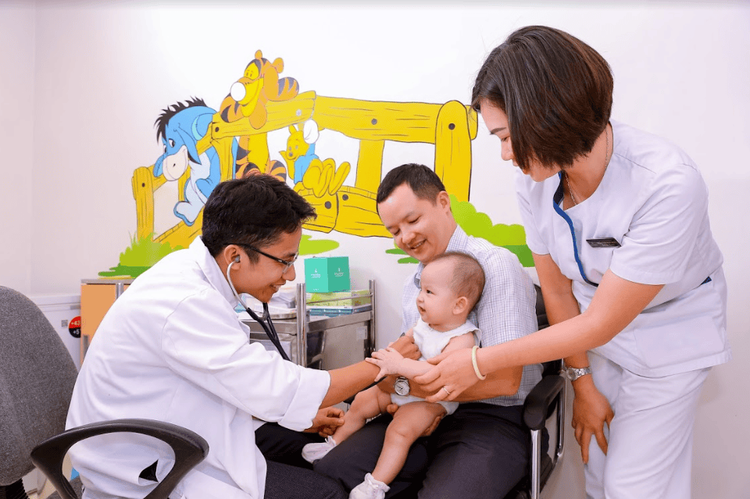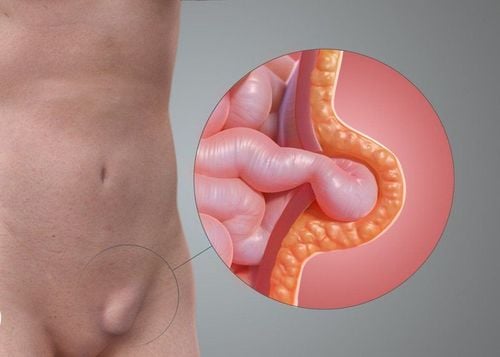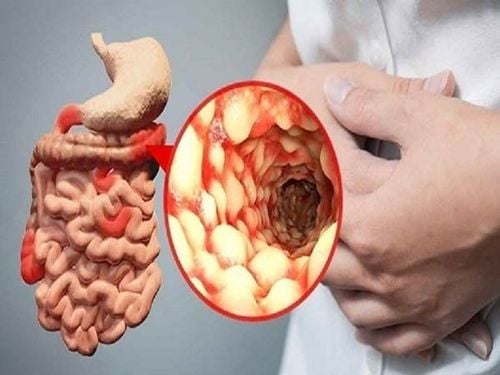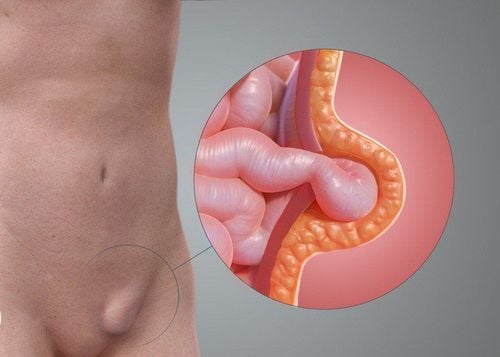This is an automatically translated article.
The article was written by Doctor Ngo Viet Thang - Gastroenterologist, Department of General Surgery - Vinmec Times City International General Hospital.
An inguinal hernia is a swollen mass at the junction of the thigh and torso. In boys, the bulge spreads down to the scrotum, the sac that contains the testicles. In girls, the bulge extends down to the labia majora, to the perianal area.
1. What is an inguinal hernia?
Normally, the abdominal organs are held in place by the abdominal wall muscles. An inguinal hernia occurs when a loop of intestine or another viscera in the abdomen is pushed out through the abdominal wall muscle. Inguinal hernias often occur in children, because children have a hole in the muscle of the female abdominal wall that usually closes soon after birth. But when the hole does not close, or when the baby is born prematurely, an inguinal hernia can occur.
An inguinal hernia can be dangerous if part of the intestine is trapped in the hernia sac and cannot slide back into the abdomen. Doctors call this condition a strangulated hernia. When this happens, the intestines don't get enough blood, so it can swell and hurt.
2. What are the symptoms of hernia in children?
The main symptom of an inguinal hernia is a bulge that appears and disappears. It usually occurs when the baby cries or struggles and goes away when the baby is resting. The child may be tired or eat poorly.
If the bowel is blocked, the inguinal bulge does not go away. In this case, the hernia mass was palpable. Other symptoms of a blocked bowel may include:
Crying Vomiting Stomach bloating Red or blue discoloration

Trẻ quấy khóc khi bị thoát vị bẹn
3. Should I see a doctor?
Yes sir yes. If your child has an inguinal bulge that comes and goes, see your doctor. Inguinal hernias in children almost always require treatment.
4. What tests will my child need?
This depends on whether your child is a boy or a girl:
In boys, testing is not usually needed. The doctor can usually just diagnose the symptoms and do the physical exam to see if your child has a hernia. In some cases, the doctor may also do an ultrasound to see if the inguinal bulge is a hernia or something else. In girls, the doctor will do an ultrasound to see if the ovaries are blocked in the hernia. (The ovaries are part of the female reproductive system.)

Phụ huynh nên đưa trẻ đến cơ sở y tế để được thăm khám
5. How is an inguinal hernia treated?
Almost all children with an inguinal hernia need surgery. Doctors usually perform surgery soon after discovering a hernia to prevent bowel obstruction. A specialist doctor called a “surgeon” will perform the surgery on your child.
Surgeons can repair inguinal hernias by one of two methods. Your doctor will decide which method is best for your child. These two types of surgery are:
Open surgery - In open surgery, the surgeon makes a small incision near the hernia. The doctor will then gently push the hernia back into its normal position. Next, the surgeon will sew the muscle layer together so that nothing can get through. Laparoscopic surgery – In laparoscopic surgery, the surgeon makes several smaller incisions than in open surgery. The surgeon then inserts long, thin instruments near the hernia. An instrument with a camera on the end sends images to a TV screen. This instrument is called a bronchoscope. The surgeon can look at the image on the screen as a guide for his or her operation. The surgeon then uses long instruments to secure the muscle layers with stitches.
If the bowel is strangled, the doctor will first try to push the hernia back into the abdomen. If you do this, the surgeon can perform the surgery in a few days. If the surgeon cannot push the hernia in, emergency surgery is needed.
Vinmec International General Hospital gathers a team of leading doctors, highly skilled and experienced, dedicated to the profession, especially well-versed in the complex surgical steps of laparoscopic surgery. child's inguinal region.
Vinmec Health System is equipped with modern and advanced facilities, international standard technical facilities, in addition, it always ensures the close supervision of medical managers, will help the case Laparoscopic surgery for inguinal hernia treatment in children was carried out smoothly and safely. In addition, in the field of surgical surgery, Vinmec possesses a very good level of anesthesia, anesthesia and analgesia, useful for surgical participants such as children.
Laparoscopic surgery to treat children's inguinal hernia is the most advanced surgical method today. This surgery has been applied at Vinmec Times City International General Hospital.
Customers can go directly to Vinmec Times City to visit or contact hotline 0243 9743 556 for support.













